
Guarding Against Crime Measuring Guardianship within Routine Activity Theory
This ground-breaking book examines the critical role that citizens play in guarding against crime. By focusing on the ways in which residents are able to capably guard their residential environments from crime, Reynald shows how local residents function (or fail to function) as effective crime controllers. The studies contained herein are aimed at developing our theoretical, empirical and practical understanding of the function of the capable guardian as a critical, yet elusive actor in the crime event model. In lieu of utilizing secondary data sources for proxy measures, this book argues in favour of new, more direct measures of guardianship, employing direct methods of primary data collection in order to capture the action dimensions of capable guardianship, as well as various other environmental and contextual factors that affect it. It features observations of guardianship in action and interviews with guardians to elucidate the factors that empower guardians to make them capable of crime control.